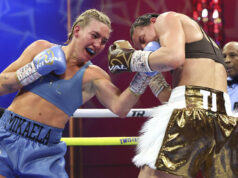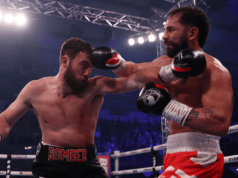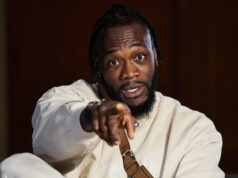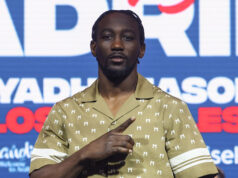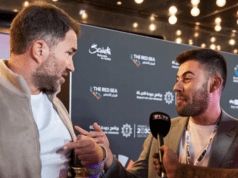Big George Talks About the State of Boxing and the Heavyweight Division:
The recent collapse of talks between rival heavyweight champions Wladimir Klitschko and David Haye has caused frustration throughout the boxing world. Instead of a period of water treading where the pair continue to collect massive paydays by defending their respective titles against either undeserving or incapable challengers, the sport is crying out for them to meet in a unification clash that would go a long way towards reviving the decreasing public interest in just who the best heavyweight on the planet is.
As the negotiations ground to a halt, we heard the usual cries of derision from boxing critics who remember the halcyon days of the division when the legendary names clashed regularly and even non boxing fans knew who the heavyweight champion was.
One of those legendary names is George Foreman. In a professional career spanning almost 30 years, ‘Big George’ was twice crowned the “Heavyweight Champion of the World”. First, as the scowling, intimidating, relentless brawler who destroyed Joe Frazier in just two rounds in 1973 to claim his first title and then as the genial 45 year old who completed boxing’s most remarkable comeback by knocking out Michael Moorer to become the oldest ever heavyweight champion almost 22 years later.
Who wins in a fight? 1970s George Foreman or 1990s George Foreman? See in this Fantasy Fight!

Whether he was demonstrating his incredible punching power against the likes of Frazier, Ron Lyle and Ken Norton, taking part in arguably boxing’s most well known event when facing Muhammad Ali in the “Rumble in the Jungle” or shocking the world that fantastic night against Moorer, Foreman has been involved in some of the sports greatest moments.
As the only heavyweight to have fought successfully in the 70’s when the best routinely faced each other and in the television controlled modern era, Foreman is ideally placed to give his views on the problems the current heavyweight division faces.
“I think we only lack publicity. The top boxers of today are just as good as any era. We just need a phenomenon.” Foreman said.
While America has traditionally been the home of the great big men, over the past decade Eastern Europe fighters have begun to dominate. The American public’s interest in the division has dropped considerably and many feel it will continue to wane until a quality, exciting American contender emerges. Foreman disagrees.
“If Mike Tyson had been from England, he would have set the boxing world on its ear. If Muhammad Ali had been from Germany he would have set the boxing world on fire. We need a phenomenon, an excellent athlete who can really box. It doesn’t matter where he’s from. He’s gotta come along and put on a show. Look at Naseem Hamed, he sparked the whole boxing world with his antics. It doesn’t matter where you’re from.”
As Foreman was a long time supporter of Hamed, it isn’t too much of a leap then to imagine that he would excited about the emergence of a brash, big punching heavyweight from the British Isles. WBA champion Haye may have caused waves in Europe with his big punching style and protracted negotiations with the Klitschko brothers but according to Foreman, those waves are still to cross the Atlantic. It seems the Londoner has yet to make any kind of impression on him.
“No, none at all. Not on me. He needs me to go over there and showcase him and get everyone in America to know about him!”
With Haye yet to appear on Foreman’s radar, “Big George” sees Wladimir and Vitali Klitschko as the cream of the modern crop. “The Klitschko brothers are good boxers. They’re not the best by any means but they beat everyone else around because they’ve had time and experience and they’ve developed their craft better than anyone else. But other than that, no one stands out in my mind.”
HBO Sports President Ross Greenberg commented last year that the apathy of American fans towards the Klitschko brothers is partly down to the fact that nobody can tell them apart. Foreman has no such trouble in selecting who he feels is the more talented of the pair.
“The younger brother (Wladimir). I like his style. His left jab, he understands now how to fight with his height. He knows how to be in condition, use his style and he never loses his head. He’s a good fighter and would have been a great fighter in any time. All he can do is get better” he says. “I don’t know too much about Vitali. When I saw him against Lewis, he was cut and hesitant and that was at his best. He’s a good boxer but I’m not high on him.”
As an Olympic Gold medalist himself (“What a thrill! That was all about hoisting my flag and showing where I was from.”) Foreman hopes the 2012 games in London will see the rise of the next major star. “I kept hoping that Mike Tyson would make a return but he’s completely burnt out. Lennox Lewis, I don’t consider him too old to make a return to boxing but I’m just hoping that in the next five years we get a proper heavyweight from the Olympics to come through. But other than that, I don’t see anything.”
Around the time of Foreman’s first incantation as heavyweight champion, fighters came from tough backgrounds and had to literally fight their way to the top. Foreman himself grew up in the tough 5th Ward area of Houston, Texas. After suffering a troubled youth, he found his way into a boxing gym and began his rise. Things have changed. The Klitschko brothers were the first reigning world champions to hold PhDs and fighters are rocketed towards million dollar paydays after a handful of fights. Wladimir Klitschko and Haye’s recent failure to agree the terms for a clash seems to give credence to the idea that today’s fighter’s lack the sheer ambition and determination that Foreman and his peers had to be the very best. Foreman says this can be traced back to the “baby boom” generation.
“Parents were having children that really took after their parents who were striving and hungry for the American dream. But not only the American dream. Europe itself had overcome the hostile environment of the war and there were so many people who wanted things for their family. That created the best boxers ever and I think by the end of the 90’s there wasn’t any left. There was nobody to give them that ambition any more. The parents of the present generation didn’t know anything about hunger.”
“It’s more than just the fighters; it’s the families of the fighters. The mothers and fathers didn’t put it to the kids and show them how to strive and that ambition almost ceased to exist for a while. The bittersweet part of it is that as the economy has almost collapsed, a lot of the mothers and fathers who had a lot have started to cry, the children have started to cry and it’s created the instinct once again to go out and create a better world and make things better for mum and dad. Its bittersweet but here we go again!”
”Because children are leaving home thinking “I’ve gotta make things better for my parents. They lost their home, my father lost his job and I’ve gotta help my sister and brother through college…..” The door is wide open for ambition again.”
Having taken part in the first ever HBO Boxing broadcast and had a spell behind the microphone as a boxing analyst, Foreman is able to voice his opinion on the impact television has had on boxing. Throughout his career Foreman was a busy fighter. After beginning his career in late 1969 Foreman had fought 37 times by the time he fought Joe Frazier for the heavyweight title in Jamaica in January 1973. To put that into context, at the time of writing, Haye has fought just twice since claiming the WBA belt with his point’s victory over Nikolay Valuev in November 2009.
“It’s really bad now. Because there is so much money involved the television companies they want you to hold up and make fights for the spring and November. They take their time now and get in shape for a big payday whereas beforehand, I would leave California and I would have to fight 3 or 4 boxing matches so I had enough money to come home and pay my rent. Fighters don’t have to worry about that today. We were so much better because we developed our craft but at the same time didn’t have enough money to stop boxing. We had to box to eat.”
Despite the title being fragmented and therefore devalued recently, being crowned the “Heavyweight Champion of the World” is still arguably the greatest achievement in sport. How did it feel to have his hand raised after destroying Frazier to claim the title?
“The most fantastic feeling you can have as an athlete. As soon as they raise your hand, its like Joe Louis, Jack Dempsey, Max Schmeling, all of these famous names just enter your whole body and your heart and soul and you become part of that history. When you raise your hand up you know instantly “There’s something different about me now”. When I fought Joe Frazier the first time, I was just a good boxer but as soon as they said “Heavyweight champion of the world” my whole being changed.”
So when Foreman recalls how good he felt to reach the pinnacle of the sport, does it make him sad to see the state of today’s heavyweight division?
“Not really because everything has to evolve. When Sonny Liston defeated Floyd Patterson, boxing wasn’t in the greatest state and then all of a sudden we reconnected with the proper history so I’m looking for things to change. Television over-glamorized and overexposed a lot of bad boxers, then came the incident where Mike Tyson bit the ear and we became a joke for a while so we’re rehabilitating ourselves at the moment. We will walk and run again!”
Since retirement, Foreman has proved as successful out of the ring as he was in it. As well as the global phenomenon of his health grills, he has launched a succession of businesses ranging from environmentally safe cleaning products to prescription shoes for diabetics. If given the chance to apply his golden touch to boxing, how would he reignite public interest in the sports most glamorous weight class?
“We had love and dignity and a lot of respect for all of the countries. When Max Schmeling fought, it was Germany fighting. When Mildenberger fought, Germany was fighting. Henry Cooper, win, lose or draw he was England. We had pride as nations. That’s what we’re missing. You don’t see individuals; you sell nations and national heroes. Frank Bruno. I remember when he would come over here, how cheerful and joyful his crowd were. He might have lost a couple of fights but his crowd were the best the world has ever seen. Pride as nations is what we’ve gotta regain.”
”What boxing really needs more than anything is boxing writers. Nobody writes about boxing. The days of the writers who would romanticize boxing are gone, we miss that. They would give us names. The boxers today don’t even have names other than their given names. The world would recreate and give them names. That will be the comeback of boxing. Writers. Television cannot tell the stories. Somebody has to penetrate the imagination and what you see on television just doesn’t do it. People have to read, read, read.”
The Foreman of the 70’s was a relentless fighting machine willing to take on all comers. If a fighter was to emerge with his brutal, exciting style it could be just the spark the heavyweight division needs. How does Foreman think the 70’s version of himself would fare if he were competing in the modern era?
“I think pretty good. I was able to fight in the 70s and box again in the 90’s. As a matter of fact I stopped boxing in the new millennium! If you have a good style, a good punch and a good heart you can operate in any era”.
“There were some good boxers around who would floor me too though! Lennox Lewis before he retired was one tough cookie. Lennox is an all time great. It didn’t matter who beat him he would come back and was brave enough to fight them again and beat them. Some fighters, when you beat them you would never see them again. Lennox did not care. He would come back and try you again.”
Foreman seems happy after permanently retiring from the ring. When not preaching the Gospel he takes an active role in helping the George Foreman Youth Centee continue to flourish. Add these to his myriad of business activities, and he has more than enough on his plate to keep him occupied. Any spare time is spent relaxing on his ranch.
“I’m a country boy from Marshall Texas. I love horses. Just give me a chance to sit around a barn and put a stalk of hay in my cheek and I’m at home. I would still love to be the owner of a horse and cross that winning line at the Kentucky Derby. That is still a burning desire in my heart. Would I be a good jockey? You bet but the horse would have to ride me! “
”I returned to boxing so I could fund the youth center. That’s what I do and I still do it. My main profession is that I’m an evangelist, preaching the word of the Lord Jesus Christ. I’m a preacher. Of course I’ve had some success in business but as long as it pays bills and feeds my five daughters and five sons I’m happy. Getting close to God enabled me to do so many things. Without that, I’d be nothing.”


